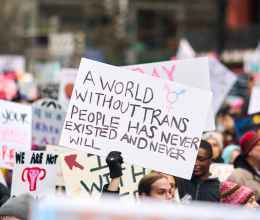
Samuel Ortiz-Diaz is a senior special agent in HUD’s Office of Inspector General in Washington, D.C., who was denied a transfer from the Washington office to a position in Albany or Hartford. Mr. Ortiz-Diaz is from Puerto Rico. The supervisor who denied the transfer had exhibited a hostile attitude toward Latinos in the office and had approved transfers for white employees who were similarly situated to Mr. Ortiz-Diaz.
Mr. Ortiz-Diaz sued under federal anti-discrimination law (Title VII) for employment discrimination on the basis of race and/or national origin. The trial court dismissed the case and a panel of the D.C. Circuit affirmed the dismissal — both on the basis that a “lateral transfer” that does not involve a loss of pay, benefits, or job responsibilities, is not an “adverse employment action” that can be challenged under Title VII.
In September 2016, we filed a petition asking the entire D.C. Circuit to rehear the case because the panel’s decision incorrectly narrows federal protections against employment discrimination by permitting employers — including the federal government — to discriminate openly on the basis of race, national origin, and other prohibited grounds in transfers, work assignments, work hours, and more.
In August 2017, in response to the petition, the original panel of judges decided to vacate its original opinion and substitute a new opinion unanimously reversing the judgment against Mr. Ortiz-Diaz and holding that the Title VII claim must be reinstated. The court explained that, “Ortiz-Diaz’s allegation of harm, that he was denied a transfer away from a racially and ethnically biased supervisor to a non-biased supervisor more likely to advance his career, falls within Title VII’s heartland. … [A] discriminatory denial of a lateral transfer away from a biased supervisor can certainly be actionable under Title VII, given the adverse impact on the employee’s potential for career advancement.” Two of the three judges on the panel expressed the hope that the court would, in the future, go even further in making clear that discriminatory lateral-transfer decisions are ordinarily subject to Title VII’s broad prohibitions against discrimination.
Five years later, in another case, the full D.C. Circuit reconsidered its Title VII precedent and overruled its requirement that a Title VII plaintiff show some further harm beyond discrimination in “terms, privileges, and conditions” of employment. Under the correct standard, it explained, discrimination with respect to a job transfer always qualifies as a violation of Title VII. The court relied prominently on the revised opinion we secured in Ortiz-Diaz.
